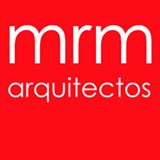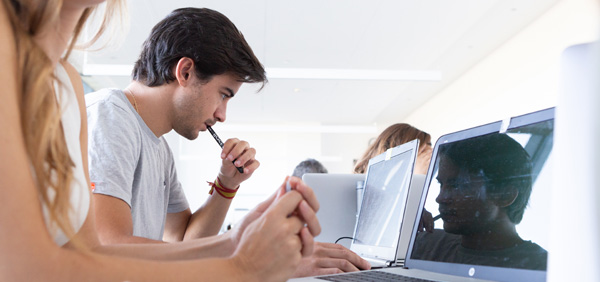We accompany students in the development of their professional career; we facilitate their first contact with the professional world and their integration into the labour market; and we respond to our commitment to the transfer of talent to society.
Internships
Managed by the Internship and Training Service and employment
The Internship Service and employment is dedicated, on the one hand, to generate opportunities through the continuous contact with the most relevant programs of study and companies in the architecture sector and, on the other hand, to provide students with the necessary training to take advantage of them. In addition, students interact on a daily basis with professionals who have a high hiring power.
The School of Architecture of the University of Navarra has agreements with more than 300 companies and programs of study first level. The student has the possibility to choose among the offers that the Master's Degree receives or to carry out an individual search and staff of such internships.
The Study program includes external internships aimed at giving the student first-hand experience of professional practice, putting into practice the knowledge acquired throughout the programme's teaching period.
The placements are assessed by a team of internal and external tutors. The external tutors of the institutions where the students carry out the internships are responsible for the appropriate selection and integration of the students in the study or business, paying special attention to the use of the internship and the adaptation of the students to their respective teams.
More information
design and quantification

The students of the Master's Degree in design and management Environmental Buildings learn to quantify the efficiency of the environmental measures adopted in order to reduce the impact of the Building on the environment. They use simulation software (Design Builder, Passive House standard, SimaPro...) and monitoring equipment to verify the real behaviour of buildings (sensors, datalogger, thermo-flowmeter, blower door, thermographic cameras).
The direct relationship of Master's Degree with the projects of research of the department Construction, Installations and Structuresof the School of Architecture, as well as the synergies with other national and international groups of research make the MDGAE a programme of training that incorporates the latest advances and results in environmental innovation and technologies of the Building.
International programme

The specialist in design and management environment of buildings develops his profession in an increasingly global environment. For this reason, the MDGAE aims for the student to acquire an international professionalprofile :
Stays at other universities
MDGAE students carry out an international stay of training in another foreign University or Technological Center. Until the academic year 2019-20, the stays were at Cardiff University (UK) and Technische Universität Dresden (Germany) and until the academic year 2020-21 the stay was at the Passive House Institute in Darmstadt (Germany). In the academic year 2024-25 it will be at the EURAC Research Center in Bolzano, Italy and the course will focus on the design of Advanced Facades.
In addition, the students of the elective module of design advanced sustainable, will be able to make another stay in a University of international prestige at the National University of Singapore.
international reference letterfaculty
The MDGAE faculty includes international professors and professionals, who contribute with their experience and knowledge of other countries applicable to the achievement of a Building more manager, from an environmental, social and economic point of view. The incorporation of faculty from different nationalities and climates provides a global vision of sustainability and a particular vision of how to materialize this concept from different points of view and climates.
specializationand innovation

MDGAE students have the opportunity to intensify their trainingat design advanced sustainable or at business.
The moduleof designadvanced sustainable allows the student fill in their knowledge in environmental certification, monitoring, simulation... taught by guest lecturers from universities, companies, technology centres..., national and international. In addition, you have the opportunity to fill inyour international trainingthrough another stay in a prestigious international university.
The trainingen business incorporates knowledge of businessand human resources which opens up a new horizon in the curriculum of studentand which will be taught with partnershipby professors from IESE Business School.
TFM in business

The training internship of the MDGAE students takes on a special importance with the completion of the work Final Project Master's Degree (TFM) in companies in the sector. This opportunity involves the application of all the knowledge and skills acquired during the programme in a real environment. With the completion of the TFM at business, the student has contact with the professional reality, acquires professional skills that facilitate their employability and fosters their entrepreneurial capacity.
During the TFM, the student of the MDGAE has two tutors: a professional of the business and an academic tutor of the MDGAE. The tutoring consists of the supervision of the activities carried out by the student, as well as guidance in the development of the TFM.
The employment rate rate of Master's Degree is 95%. The MDGAE puts student on contact with companies that demand specialised professionals who provide real solutions to their needs.
The University of Navarra's School of Architecture has agreements with more than 300 top-level companies and programs of study . Some of the companies where students carry out their final work Master's Degree are:
|
|
||||
|
|
|
|
||
|
|
|
|
||
|
|
|
|
|
|
 |
|
|
 |
|
 |
 |
 |
||
Methodology

The programme uses the case method as a system of teaching, which consists of solving real problems involving thorough analysis of the facts and proposal of solutions and alternatives. To get the most out of it, student is required to prepare each case individually and then discuss it in a team before attend at discussion on class directed by the teacher. It is a process that enriches learning due to the contributions of the other class colleagues and the solution proposed by the teacher.
Phase 1. Individual study
The student is only confronted with the problems it faces in order to be able to analyse them in depth and offer its own solution.
Phase 2. teamwork
All cases are discussed in teams, so that the individual analysis is enriched by the approach of the other colleagues.
Phase 3. Plenary session (class)
The teacher leads the students' discussion at class. Their role is to ensure that the analysis is rigorous and considers all possible alternatives.
In addition to this, the following learning methodologies are also used:
-Lectures by the lecturer in which the fundamental points of subject are set out in order to prepare the student for practical subjects student . The blackboard, computer, projections, etc. will be used for this purpose. It is advisable for students to go to class having prepared the corresponding Materials , which will be available beforehand.
-Discussion of problems posed by the teacher and their public discussion. Previous personal work and the organisation of the discussion in working groups are required.
- Case discussion. Through the analysis of real cases, students and faculty engage in a process of in-depth discussion about the circumstances faced by a professional in the world of architecture.
-Simulation of professional situations. The starting point is a scenario similar to those faced in the practice of the architect's profession so that the student, personally and by group, adopts different roles and acquires the work habits that characterise the profession.
-Address of project Final Degree and/or Master's Thesis.
-Tutoring. Sessions with the lecturer and/or with the tutor internship.
- Preparation of reports, briefs, opinions and the like.
Support

Advising is an indispensable element of the University of Navarra's project educational , which aspires to the integral formation of students. The advisor is an essential figure who will accompany student in their academic journey, providing student committee and guidance so that they can develop all their potential and make the most of all aspects of their professional future. At final, a personalised development plan is provided.
During the first days of the course the student chooses who will be their advisor, who will also be their tutor of the project End of Degree and their tutor academic during the curricular professional internships.
The advisor provides student with information, training and guidance on the various aspects of university life:
- Improved intellectual preparation and academic performance.
-development of profile professional and professional skills.
-Motivation of student in its own training process.
- Encouragement ofcreativity, autonomous learning and responsibility.
- Guidance in academic and professional decision-making.
Counselling has its own characteristics that differentiate it from other possible teacher-counselling relationshipsstudent:
-It is personal: it provides individualised committee and guidance.
-It is voluntary, and therefore, it is not assessable and does not form part of the academic curriculum.
- It is university: counselling makes it easier to discover horizons beyond the strictly academic.









